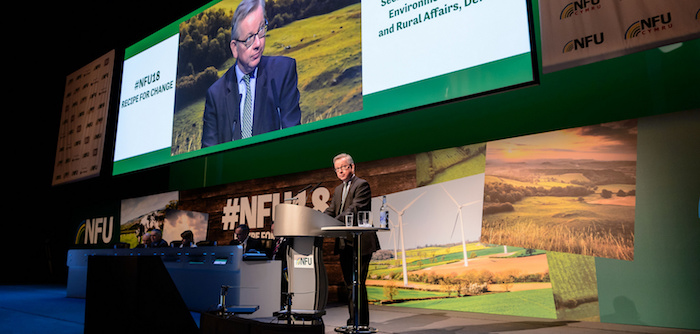Michael Gove has set out plans to redirect money from the current direct payment support system to a new system of paying farmers ‘public money for public goods’ in England after we leave the EU.
The Defra Secretary has published a 10-week consultation today that he said would give farmers, landowners and food producers have a once-in-a-generation opportunity to shape the future of English farming and the environment.
The change will be phased in during an ‘agricultural transition’ lasting a number of years beyond the implementation period during which direct payments would continue, providing stability and certainty for farmers as they prepare for the new system. The consultation asks respondents for their views on exactly how long it should last.
As Mr Gove has previously flagged up on numerous occasions, the principal public good will be support for farmers to ‘enhance the environment and invest in sustainable food production’. The document seeks views on how a new environmental land management scheme could look.
But there will be other definitions public goods, too, including some that will provide opportunities to farmers. These include investment in technology and skills to improve productivity, providing public access to farmland and the countryside, enhanced welfare standards for livestock and measures to support the resilience of rural and upland communities.
In line with its manifesto commitment, the government will continue to commit the same cash total in funds for farm support until the end of this Parliament in 2022.
In the first year of the transition, the Government proposes to shift up to around £150 million from the current, area-based direct payment towards the public goods system. The consultation proposes a number of options for phasing out direct payments, including:
- Progressive reductions to farmers’ payments, with higher percentage reductions applied to amounts in higher payment bands
- A cap to the largest payments
- A different cap or reduction to some payments.
A cap of the largest payments could, for example, be applied at £100,000 which would affect around 2,100 farmers (2% recipients).
The progressive reductions option could, in the first year of the agricultural transition, affect around 19,000 farmers (22% of recipients). Of these, 13,500 would face a payment reduction of less than £5,000 and around 3,000 of the farmers with claims worth over £200,000 would face a payment reduction of over £75,000. Both of these options could raise around £150 million in the first year
Mr Gove said: “As we leave the EU, we have a historic opportunity to deliver a farming policy which works for the whole industry. Today we are asking for the views of those who will be affected to make sure we get this right so any future schemes reflect the reality of life for famers and food producers.
“The proposals in this paper set out a range of possible paths to a brighter future for farming. They are the beginning of a conversation, not a conclusion and we want everyone who cares about the food we eat and the environment around us to contribute.”
Summary of consultation questions
The consultation, Health and Harmony: The Future for Food, Farming and the Environment in a Green Brexit’, seeks views on:
- Options for how to gradually phase out direct payments, starting with the largest landowners, while developing a new environmental land management scheme.
- The range of public goods that could qualify for government funding under the new schemes, such as high animal welfare standards, wildlife protection, public access, and new technologies
- Measures to move away from heavy handed enforcement which penalises farmers for minor errors, including a more efficient inspection regime to uphold important environmental and animal welfare standards
- New business models and incentives for industry to invest in innovation and new technologies to increase their profitability.
- Farm payments in 2019 will follow the existing model, and in the meantime, the government has pledged to simplify applications for farmers wishing to enter into existing schemes to provide environmental benefits such as Countryside Stewardship.
The consultation will run for ten weeks, closing on 8 May 2018.




